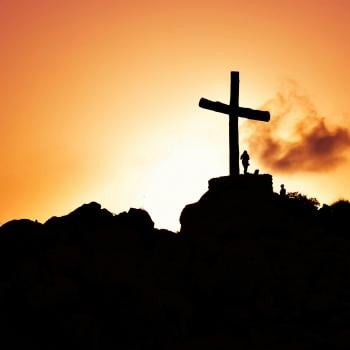The Adventurous Lectionary – October 29, 2023 – The Twenty-Second Sunday of Pentecost
Deuteronomy 34:1-12
Psalm 90:1-6, 13-17
1 Thessalonians 2:1-8
Matthew 22:34-46
In the midst of congressional chaos, the intentional provocation of violence and disorder by USA politicians, and wars in Ukraine and Israel-Gaza, this Sunday’s readings point us beyond the individual self – and our individual and national life histories – to identification with God’s Self and the well-being of others long after we have left the scene. They move us from self-interest and nationalism to world loyalty and from short term goals toward the wellbeing of generations decades from now. Our lives are not only lived in the moment but participate in the philosopher Alfred North Whitehead describes as “objective immortality,” the impact of our lives on the future world and in God’s ever-expanding memory. Each moment moves us toward life or death, beauty or ugliness. On the large and small, we can choose life or death. Letting go of the small ego and its interests awakens us to the grandeur of the universe. Surpassing self-interest is the gateway to peace and to adventure in companionship with God. These scriptures challenge us to move from individual and national self-interest to world loyalty. They remind us that we need to care for people we will never meet and generations we will never see. They remind us to put our Christian values to work in the political process in a time in which many Christians cannot see beyond race, power, and political domination, and quite willingly embrace political celebrity and prevarication.
“I have been to the mountaintop; I have seen the Promised Land.” These words proclaimed by Martin Luther King could easily echo Moses’ sentiments as he looked toward Canaan. He had shepherded an emerging nation; he brought them from no people to the verge of their new homeland, but he will be unable to set foot on the ground that inspired his dreams. He has prepared for a world – a promise – he will not live to see. Centuries later, Martin Luther was asked, “If the world was to end tomorrow, what would you do?” He responded, “I would plant a tree.” All of us, individually and corporately, are creating the future by our actions today. We may never enjoy or see the fruits of our actions, but still, we claim our ability to shape the future, and that is the point. Hope enables us to trust that God will use our finite lives as contributors to an everlasting adventure. On the day after his mountaintop speech, King was gunned down in Memphis; yet this “mahatma” or great soul, still lives on, inspiring us to justice and encouraging us to commit ourselves to a transformed America
Today’s passages take us beyond instant gratification and self-interest. They remind us that our lives share in God’s immortality. What we do truly matters and shapes a future we may never see. Looking toward Reformation Day and All Saints, we are reminded that the saints let go of the small self and its short time span to embrace values beyond the self. We let go of self-interest to embrace the well-being of future generations. We do something beautiful for God that will outlast our small projects and even our lifetimes.
The story of Moses invites us to leave a legacy of time, talent, and treasure. Our legacy of time well-spent lives on in our children and grandchildren, in the achievements of students and congregants, in the values embraced by those we touch. Our legacy of talent involves the immortality of our creative work. Each sermon or text leaves a mark that can transform lives. Living out our vocations brings healing and beauty to the world. We leave a legacy of treasure as well, sharing our largesse for the well-being of future generations. I am somewhat suspicious of the bumper sticker saying, “We are spending our children’s inheritance.” Yes, we must take care of ourselves and this may mean using our largesse for purely joyful experiences that neither toil nor spin. Yet, our largesse lives on in the stewardship of our finances toward our families and the vulnerable in our midst. We have received and must pass along our gifts to future generations. Our largesse is not our own but lives on in supporting what we valued in this lifetime. Israel lived on the legacy of Moses and we still are shaped by his faith and insight.
Moses, the great leader, walked with God and became the paradigm for what religious leadership and political leadership is to be. While we do not live in a theocracy, we can be guided by values larger than self, power, and nation, to be – even in a pluralistic society – agents of the moral and spiritual arcs in history.
In a world of change and mortality, the Psalm speaks of God as our home, a safe and yet challenging place where we grow and spread our wings. Home is the place to which we return for rest so that we can find our center and then expand our center to embrace the world. Our homes embrace both space and time and inspire our spiritual evolution. God is the dwelling place, the crucible, who allows us to risk and create, to explore the boundaries of our freedom, and still be accepted and affirmed. We all need a home, a dwelling place for the spirit, in these troubled times. To remember that our times are in God’s hands enables us to face the crises we face with peace that inspires protest and the embodied imagination of another world.
In the midst of our national and international chaos, the words of Thessalonians can provide guideposts for our citizenship. In the letter to Thessalonians, Paul speaks of “pleasing God” rather than humans. His words suggest that when we love God and let our love for God determine our behavior and values, everything else falls into place. In Paul’s relationship with the Thessalonians, his devotion to God is made manifest. Leadership is grounded in the power of love and not the love of power. In going beyond his ego, Paul, as another paradigm for leadership, is doing something beautiful for God, something that will endure from generation to generation. In pleasing God, in living by the vision of Shalom and aligning ourselves with the moral and spiritual arcs of history, we help create a world that mirrors God’s values: we enable God to be more active in our lives and in the world.
The passage concludes with the apostle speaking of sharing ourselves, that is, making our lives a gift to others, making our mission a contribution to the beauty of the earth, giving and receiving love in every encounter, and healing the world one moment at a time. In our divisive society, Paul reminds us that there is another way. A path that honors diversity but asks us to act in accordance with higher and more transcendent values. To challenge and protest, to affirm our viewpoint, while seeing the holiness in others. Pleasing God means letting God’s way, the way of inclusion and hospitality, guide our decision-making and relationships in an increasingly divided world. (For more on civility in an uncivil world, see Bruce Epperly “God Online: A Mystic’s Guide to the Internet, Anamchara Books or for the interplay of spirituality and political transformation, see “Process Theology and Politics,” “One World: A Process Perspective on the Lord’s Prayer,” and “Talking Politics with Jesus: The Sermon of the Mount from a Process Perspective” from Energion Books. )
Jesus’ response to the Jewish teachers reveals the dynamic symbiosis of loving God, others, and self. These cannot be separated but are interdependent and support one another. Loving God is world affirmation. When we love God, all of our other loves are rightly ordered. Loving God turns us toward our neighbor and her or his physical, emotional, and spiritual well-being. It also turns us toward the non-human world, so beloved by God. Loving our neighbor brings beauty to God’s experience of the world: in a very real way, we love the Creator by loving the creatures. In Luther’s language, our opening to God’s grace enables this grace to flow to our neighbor, and for us to become little Christs committed to the well-being of neighbors and strangers. Loving God takes us beyond the present moment to embrace the future in its uncertainty.
Finally, authentic and healthy self-love gives us energy and Eros for the long haul. If we do not love ourselves, that is, feel at home in our skin and affirm our very existence in its uniqueness, our behaviors will often be motivated by the need to be loved rather than bringing joy to ourselves and others. Healthy self-love is a spiritual matter grounded in commitment to joining spiritual practices with acts of love.
We are called to love ourselves as much as God loves us, and to love others with the same spirit that God loves them. Jesus would feel quite comfortable with Rabbi Hillel’s wise statement: “If I am not for myself, who will be for me? If I am only for myself, what am I? If not now, when?”
True love expands self-interest and invests in futures we will never experience and love children we will never meet, whether in other lands or future generations. The love that takes us beyond ourselves and invests in God’s vision gives us a peace that passes all understanding; a peace that can never be threatened by loss, aging, or death. Our commitment to living in accord and embodying God’s love shapes our politics and economics as well as our relationships. (For more on the theology underlying this commentary, see Bruce Epperly, “Process Theology: Embracing Adventure with God” and “Process Theology: A Guide for the Perplexed,” published by Energion and T.T. Clark/Continuum, respectively.)
Today’s scriptures invite preacher and congregant to explore leadership that transforms and heals. We are challenged to be countercultural: to see our citizenship as a commitment to healing and wholeness and to nurture leaders who have a global, not parochial, vision. In a pluralistic nation, the church can be a guiding light talking us beyond self-interest, political bullying, and white nationalism to imagine and then embody beloved community in our congregation and nation and international relations.
+++
Bruce Epperly is a pastor, professor, spiritual guide, and author of over seventy books, including JESUS – MYSTIC, HEALER, AND PROPHET; THE ELEPHANT IS RUNNING: PROCESS AND OPEN AND RELATIONAL THEOLOGY AND RELIGIOUS PLURALISM; PROPHETIC HEALING: HOWARD THURMAN’S VISION OF CONTEMPLATIVE ACTIVISM; MYSTIC’S IN ACTION: TWELVE SAINTS FOR TODAY; WALKING WITH SAINT FRANCIS: FROM PRIVILEGE TO ACTIVISM; MESSY INCARNATION: MEDITATIONS ON PROCESS CHRISTOLOGY, FROM COSMOS TO CRADLE: MEDITATIONS ON THE INCARNATION, and THE PROPHET AMOS SPEAKS TO AMERICA. His most recent books are PROCESS THEOLOGY AND THE REVIVAL WE NEED, TAKING A WALK WITH WHITEHEAD: MEDITATIONS WITH PROCESS-RELATIONAL THEOLOGY, and SIMPLICTY, SPIRITUALITY AND SERVICE: THE TIMELESS WISDOM OF FRANCIS, CLARE, AND BONAVENTURE. He can be reached at [email protected].












